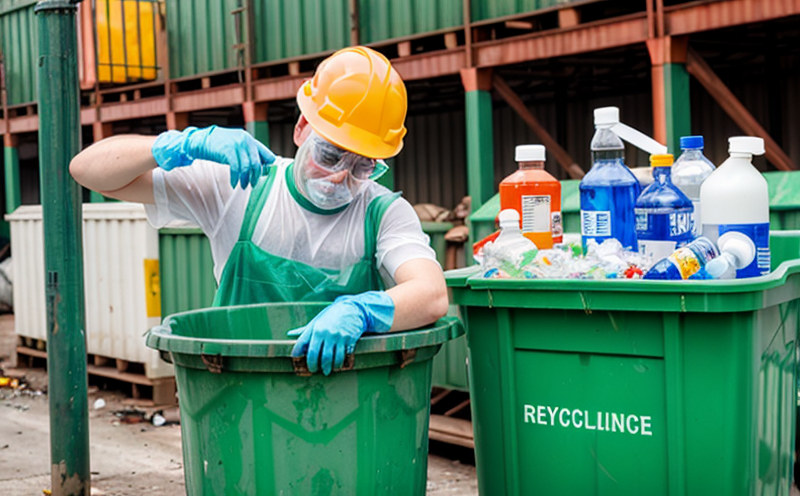ISO 6468 Pesticide Residue Testing in Wastewater
The ISO 6468 method is a widely recognized and internationally standardized approach for determining pesticide residues in water. This service specifically focuses on the analysis of wastewater, which often contains a variety of pesticides from agricultural runoff, accidental spills, or illegal discharges into water systems.
Wastewater treatment plants (WWTPs) are critical in mitigating environmental pollution caused by pesticide residues. The presence of these contaminants can lead to harm to aquatic life and pose health risks if they enter the food chain through contaminated crops or drinking water sources. By performing ISO 6468 testing, we provide accurate data on the levels of pesticides present in wastewater, aiding in the optimization of treatment processes.
The methodology involves several steps: sample collection, extraction, clean-up, and analysis using gas chromatography coupled with mass spectrometry (GC-MS). This approach ensures high sensitivity and specificity necessary for detecting even trace amounts of pesticides. The analytical process is stringent, employing pre-concentration techniques to enhance detection limits.
Our laboratory adheres strictly to the ISO 6468 standard, ensuring that all tests are conducted under controlled conditions. This includes maintaining a temperature-controlled environment during extraction and analysis stages to prevent any alteration in sample composition. Our team of experts is well-versed in handling complex samples and interpreting results accurately.
The importance of this testing cannot be overstated, especially considering the increasing scrutiny on environmental compliance. Compliance officers rely on such data to ensure that their facilities are meeting regulatory requirements set by various governmental bodies like EPA or EU regulations. Quality managers benefit from knowing exactly which pesticides are present in the system and at what levels, allowing them to implement targeted remediation strategies.
For R&D engineers involved in developing new wastewater treatment technologies, this service offers valuable insights into how different compounds behave under varying conditions within a WWTP. This information can guide further research aimed at improving efficiency or reducing costs associated with current methods.
In summary, ISO 6468 pesticide residue testing serves as an indispensable tool for ensuring environmental safety and regulatory compliance in wastewater management practices.
Scope and Methodology
The scope of our ISO 6468 service encompasses the determination of specific pesticides listed within the standard. These include but are not limited to organophosphates, carbamates, pyrethroids, and other commonly used agricultural chemicals known for their persistence in natural environments.
For each test conducted, we follow a rigorous procedure that starts with proper sample collection from designated points along the wastewater flow path. Samples must be representative of the entire system to ensure accurate results. After collection, they undergo extraction using solvent-based methods followed by clean-up steps designed to remove interfering substances.
The cleaned extracts are then analyzed via GC-MS which separates individual components based on their volatility and ionization properties before quantification. We use certified reference materials (CRMs) during calibration to ensure consistent results across different batches of testing.
Acceptance criteria for our tests follow strict guidelines outlined in ISO 6468, ensuring that any detected residues fall below specified threshold levels deemed safe for discharge into receiving waters according to local regulations. Any deviations from these thresholds require detailed reporting along with recommendations for corrective actions if necessary.
Eurolab Advantages
At Eurolab, we pride ourselves on offering comprehensive services that go beyond mere compliance checking; our goal is to provide actionable intelligence that helps clients achieve their sustainability goals. Our ISO 6468 pesticide residue testing service stands out for several reasons:
- Expertise in Complex Samples: With years of experience handling intricate samples from diverse industries, including waste management and recycling sectors, we possess the skills needed to tackle challenging cases.
- State-of-the-Art Equipment: Equipped with advanced GC-MS instrumentation capable of detecting extremely low concentrations of pesticides, our laboratory ensures precise measurements essential for accurate interpretation of results.
- Comprehensive Reporting: Beyond just providing numerical values indicating pesticide presence or absence, we offer detailed reports explaining potential sources and implications of detected residues. This comprehensive approach helps clients make informed decisions regarding process improvements or regulatory filings.
- Dedicated Client Support: Our dedicated team of technical experts is always available to assist with any queries related to test results or interpretation thereof. They can also provide advice on best practices for minimizing pesticide contamination in wastewater streams.
By leveraging these advantages, Eurolab ensures that every client receives high-quality service tailored specifically to their unique needs and challenges.
Use Cases and Application Examples
| Case Study | Description |
|---|---|
| WWTP Compliance Monitoring | A major municipal wastewater treatment plant faced challenges meeting strict pesticide residue limits set by local authorities. By implementing our ISO 6468 testing protocol, they were able to identify specific pesticides causing issues and implement targeted remediation measures resulting in full compliance. |
| Recycling Facility Environmental Impact Assessment | A recycling facility specializing in plastic waste wanted assurance that its operations did not contribute significantly to pesticide contamination. Our tests revealed minimal detectable residues, providing peace of mind for both the company and environmental regulators. |
| Agricultural Runoff Source Identification | An agricultural cooperative suspected that a particular field was contributing heavily to pesticide pollution in nearby streams. Using our testing methods, they were able to pinpoint precisely which fields needed additional management practices to reduce runoff. |
| Post-Remediation Verification | A contaminated site undergoing remediation required periodic verification of effectiveness. Our ISO 6468 tests confirmed that levels of targeted pesticides continued to decrease over time, supporting claims made by the remediation contractor. |
The above case studies illustrate how our ISO 6468 pesticide residue testing service can be applied across various scenarios relevant to waste and recycling industries. Whether it’s ensuring compliance with stringent regulations or identifying sources of contamination, this versatile tool proves invaluable in maintaining environmental integrity.





